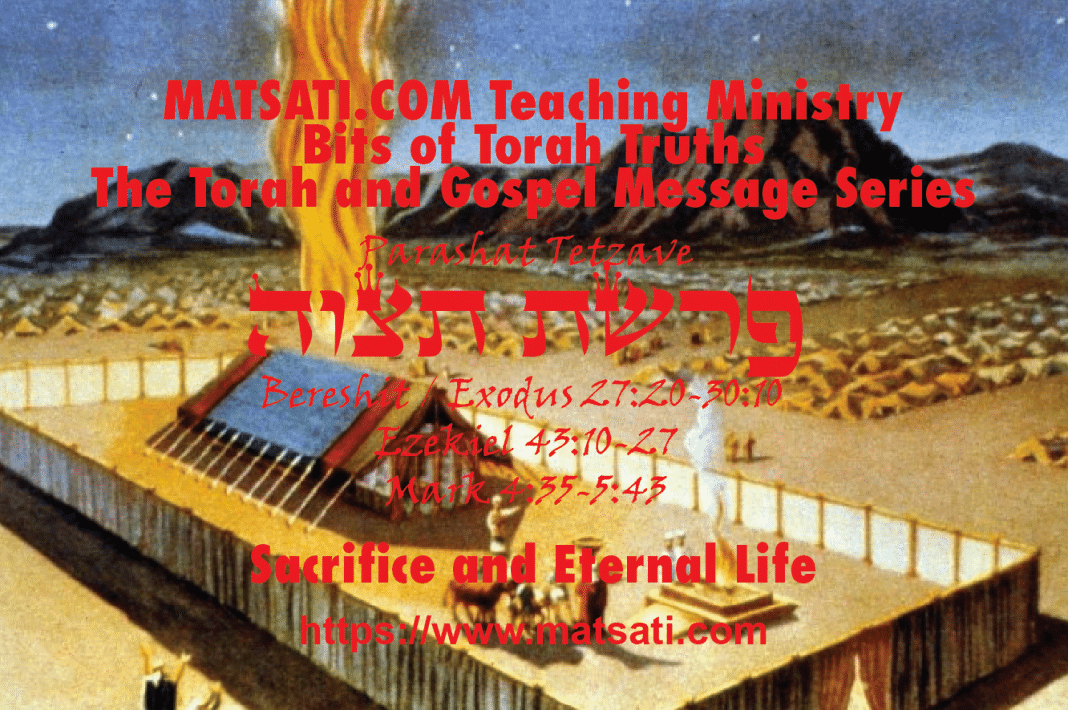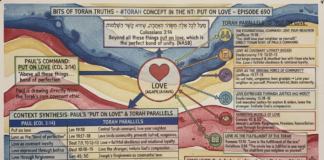In Shemot / Exodus 25:8 we read the Lord God saying, “Let them make for me a sanctuary that I may dwell in their midst” (ח וְעָשֹוּ לִי מִקְדָּשׁ וְשָׁכַנְתִּי בְּתוֹכָם). The Hebrew word for “sanctuary” is mikdash (מקְדָּשׁ), which is derived from the root word kadash (קָדַשׁ) meaning “to be set apart as sacred.” A mikdash is therefore a “set apart space,” or a “holy place.” The mikdash represents a treasured place for drawing near to the Lord, a place of rest, worship, and refuge. In Parashat Tetzaveh, The Scriptures tell us how the Lord God is going to meet us at the entrance to the Tabernacle. Shemot / Exodus 29:39 ‘The one lamb you shall offer in the morning and the other lamb you shall offer at twilight; 29:40 and there shall be one-tenth of an ephah of fine flour mixed with one-fourth of a hin of beaten oil, and one-fourth of a hin of wine for a drink offering with one lamb. 29:41 ‘The other lamb you shall offer at twilight, and shall offer with it the same grain offering and the same drink offering as in the morning, for a soothing aroma, an offering by fire to the Lord. 29:42 ‘It shall be a continual burnt offering throughout your generations at the doorway of the tent of meeting before the Lord, where I will meet with you, to speak to you there. 29:43 ‘I will meet there with the sons of Israel, and it shall be consecrated by My glory. (NASB, לט אֶת-הַכֶּבֶשֹ הָאֶחָד תַּעֲשֶֹה בַבֹּקֶר וְאֵת הַכֶּבֶשֹ הַשֵּׁנִי תַּעֲשֶֹה בֵּין הָעַרְבָּיִם: מ וְעִשָּׂרֹן סֹלֶת בָּלוּל בְּשֶׁמֶן כָּתִית רֶבַע הַהִין וְנֵסֶךְ רְבִיעִת הַהִין יָיִן לַכֶּבֶשֹ הָאֶחָד: מא וְאֵת הַכֶּבֶשֹ הַשֵּׁנִי תַּעֲשֶֹה בֵּין הָעַרְבָּיִם כְּמִנְחַת הַבֹּקֶר וּכְנִסְכָּהּ תַּעֲשֶֹה-לָּהּ לְרֵיחַ נִיחֹחַ אִשֶּׁה לַיהוָֹה: מב עֹלַת תָּמִיד לְדֹרֹתֵיכֶם פֶּתַח אֹהֶל-מוֹעֵד לִפְנֵי יְהוָֹה אֲשֶׁר אִוָּעֵד לָכֶם שָׁמָּה לְדַבֵּר אֵלֶיךָ שָׁם: מג וְנֹעַדְתִּי שָׁמָּה לִבְנֵי יִשְֹרָאֵל וְנִקְדַּשׁ בִּכְבֹדִי:) It is interesting to observe how the Lamb of God, the daily tamid sacrifice, is where God will meet and speak with us. We are told how this place in which the Lord is meeting with the people, will be sanctified (consecrated) by the glory of God. The point is the Altar of God is near the entrance of the Tabernacle and the Lord God speaking to His people is connected to the Altar, atonement, and sanctification. Notice something about the gematria of the word mishkan (מִשְׁכָּן) which is 401. This is the same numerical value as the word shema (שְׁמַע) meaning “hear!” or “listen” (Devarim / Deuteronomy 6:4). This provides us with a connection to stopping and listening to the Lord and remaining in His glorious presence.
The greatest message of the mishkhan (tabernacle) is sacrificial love. The tabernacle was meant to draw us closer to God, and to encourage us to walk in His ways. The innocent life for the guilty provided hope, deliverance, redemption, and demonstrates the holiness and righteousness of God. The Lord God made a way for forgiveness and mercy, love and acceptance. The book of Hebrews (8:5, 10:1) states that these are shadows of the heavenly reality that is given in Yeshua the Lamb of God. In the sacrifice is the picture of eternal life, and of having fellowship with God. The love of God does these things, and the heart needs to trust in these things that are written according to the Scriptures. It is within the heart that we find communion, fellowship, and intimacy with God. The Lord God of Israel is faithful and true keeping His word, and His promises. (Devarim / Deuteronomy 7:9, Tehillim / Psalms 12:6, Matthew 24:35) Because the Lord God is trustworthy and true, we too are to be trustworthy and true, found in the words that we say since our words come from the heart. The Hebrew language hints at this in the word for “thing” (devar, דבר) which can also mean “word.” The words of our heart define who we are, they set the course of one’s life, one’s direction in life, because our words come from our heart. When we speak, we are using the breath of God that was given to each and every one of us. This is how Yeshua spoke of our words as good or evil treasure according to Luke 6:45. The condition of our heart, the inward man, our motivations, affect the way we behave and what we say. This is why Yeshua spoke of every careless word being accounted for, we will give an account on judgment day. (Matthew 12:36-37) Salvation in Yeshua is even based upon the confession of truth, our words. These things speak to the importance of our words as a means for healing or destruction, love or hate. King David wrote in Tehillim / Psalms 19:14 “Let the words of my mouth and the meditation of my heart be acceptable in your sight O Lord, my rock and my redeemer.” (טו יִהְיוּ לְרָצוֹן | אִמְרֵי-פִי וְהֶגְיוֹן לִבִּי לְפָנֶיךָ יְהֹוָה צוּרִי וְגֹאֲלִי)
The concepts we are being taught here are in relation to the Lord God being our God, to His sanctifying our lives, in the anointed one (priesthood / Messiah), in the blood of the sacrifice, in the confession of sin, in Teshuvah (repentance), in seeking the Lord’s presence in our lives, and in His Holy Spirit coming into our lives making His presence a permanent part of our lives. We are told in Devarim / Deuteronomy 6:9 that we are to write the words of the Torah upon the doors of our house and on our gates. Some of the sages interpret the word for gates (שערים) to refer to the sense organs such as the “gate of the eye” or the “gate of the ear,” etc. This means we are naturally inclined to turn away from the Torah, and the command to write these words upon our houses and our gates is a reminder of the sanctity of our lives before God! As God’s people, His presence is always with us, whether we perceive it or not. This is why God’s Mitzvot (His commands) are so important and go hand in hand with the Gospel Message. In the Olat Tamid sacrifice, we are given the reason for the twice daily lamb of God offering, its purpose is to sanctify the Altar. Notice something about how the Lamb of God is commanded for the morning and the evening. This suggests something about our lives, as touching Yeshua, the Lamb of God, each day of our lives, all day long, for the purpose of forgiveness, sanctification, and redemption. We are also told, all of those who approach and touch the Altar are set apart, sanctified as holy before God. (Shemot / Exodus 29:37 according to the Torah.) The place where the people come before God (at the entrance of the Tabernacle) is also sanctified and God will meet with them. This is connected to the Altar, atonement, forgiveness, and salvation, all of which is tied to the Lamb of God! These things speak to how we guard our hearts from corruption and hardness, and how these things will set the path (road) of our lives. Above all, more than anything else, we must be careful to guard our hearts from both the improper thoughts and also the obstruction of sin. This is how faithfulness works, connecting us to meeting God at the Altar and the Lamb of God who begins the day, every day, morning and evening, a perpetual sacrifice, to sanctify the Altar, the place, and the people for service to God, for the glory of God. The significance to this context on the Lamb of God and the people hearing from God reveals to us the NT usage of the Lamb of God to Yeshua the Messiah, hearing from God, and sanctifying all of those who come to him. Briefly looking at the NT Scripture (examine Romans 15:16, 1 Corinthians 6:9-11, 1 Thessalonians 5:23, 2 Thessalonians 2:13, Hebrews 10:10, 1 Peter 1:2) we learn how the disciples interpreted these things saying that we are sanctified by the Word of God, we are sanctified by the Spirit of God, we are sanctified by the Messiah of God, we are also sanctified by God Himself. These things function as a type and shadow of what God was trying to speak to His people regarding His Messiah, repentance, the forgiveness of sin, and having a relationship with Him, all of which is contained within the Lamb of God! These are the reasons why the Torah is a fundamental and foundational part of the Gospel Message. Without the Torah, understanding the NT would be next to impossible!









